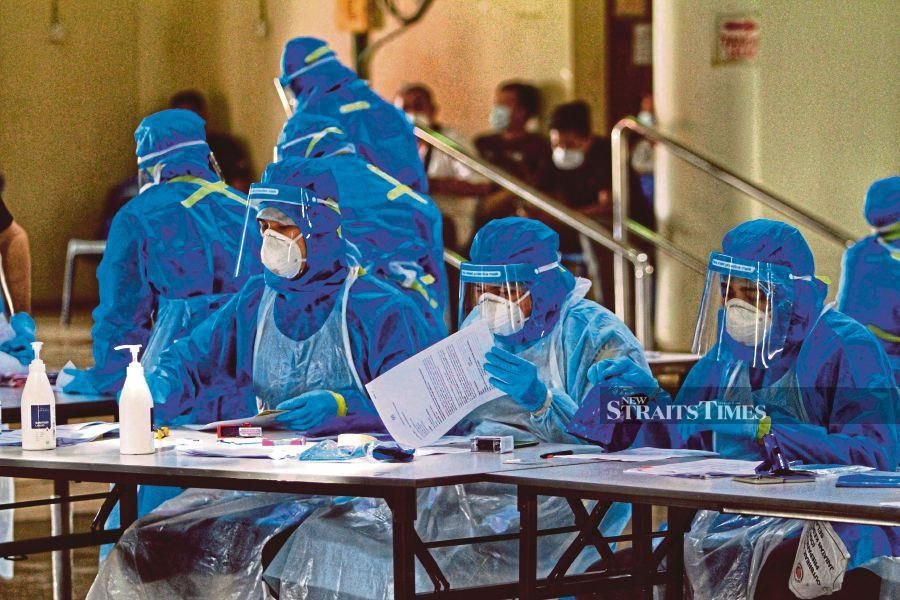Covid-19: Community transmissions now a real danger

September 10, 2020 @ 11:34am
KUALA LUMPUR: The rise of the Sungai Cluster in Kedah, Penang and Perlis has been described as a "ticking time bomb" in the northern region, with experts calling for prompt action and out-of-the-box solutions by the authorities.
Virologist Dr Sazaly Abu Bakar said the scientific community's longstanding fear for Kedah due to its past record with the virus (Sivagangga cluster) was now compounded by the belief that there are a number of asymptomatic people who are responsible for flaring up clusters of infections.
"We don't have a handle on Kedah yet, and won't until there is extensive testing. The entire population of the state needs to be tested to put a quick end to these clusters," he said, when contacted byNew Straits Times yesterday.
YOU MAY ALSO LIKE
Covid-19: Malaysia's infectivity rate surges to critical level
Don't take it easy just yet, Dr Noor Hisham reminds Malaysians
State govt to distribute food supplies to TEMCO areas, says Kedah MB
Covid-19: Perlis looking at possible closure of more schools

Dr Sazaly Abu Bakar
He said in the meantime, health authorities had to go to the ground to explain the dangers of breaking standard operating procedures (SOPs).
Sazaly said this was crucial for Kedah as the state seemed to be the epicentre of several clusters (other than Penang and Perlis), and several serious incidents of quarantine violation had been detected during the recent Targeted Enhanced Movement Control Order (TEMCO).
"Disseminating messages has to be done aggressively. Statements cannot be just made from Putrajaya, and elected representatives also have to step up.
"People need to understand why they need to stay home. Most people think the disease affects mainly people in the Klang Valley, and it would not infect them as they lead simple lives.
"This is why you have people breaking TEMCO to go shopping in Perlis or hold kenduri during MCO."
"Failure in communicating the dangers of the disease and the breaking of SOPs by these people are the glaring shortcomings in the Health Ministry's messaging. And some don't even have smartphones, so how do social media messages go through?"

A few shoppers at the almost empty Pekan Rabu Complex in Alor Star yesterday. -NSTP/AMRAN HAMID
Sazaly, the director of Universiti Malaya's Tropical Infectious Diseases Research and Education Centre, said the country's relatively low mortality rates had exacerbated this laxity in SOPs adherence, making them believe that at worst, it would be like a regular bout of dengue.
He said the fact that the Sungai Cluster flared up due to contact with a patient, while it was still unknown how the patient was infected in the first place, meant that community transmission was now on the cards.
"With new clusters popping up, we are dealing with a scary situation when we consider how people are now going on holidays in the country.
"When Klang Valley had water cuts recently, many people took to the road for trips. Some went north and when they went to Langkawi, they didn't visit just one place.
"It's a ticking time bomb if we are not careful. This could be the source of our third or fourth wave."
Sazaly said the Health Ministry would possibly impose TEMCO if the infection rates in certain areas rose further. He, however, said that it would wait a week to view the progress of figures.
Dr Chee Hui Yee, a virologist at Universiti Putra Malaysia, said it was more likely that the Sungai Cluster rose from lax observation of SOPs, rather than the existence of a "super-spreader" virus.
"Even in our teaching hospital, there are patients not wearing masks or staff not wearing masks properly.
"I have reprimanded a few when I see them. The same logic applies for the prisons and detention centres in Sabah.
"So, whether there are superspreader viruses in the mix, it's immaterial.
"We need to impose TEMCO in affected areas of the Sungai cluster immediately," she said, adding that the same had to be done to curb the situation in Benteng and Lahad Datu in Sabah.
On Tuesday, Health director-general Tan Sri Dr Noor Hisham Abdullah said the Covid-19 infectivity rate, or R-naught (R0) in Malaysia, which currently stood at 1.72, had exceeded the critical mark of 1.6. This was a drastic change from the previous infectivity rate of 0.72.
He said based on the ministry's assessment, there was an increase in community transmission in the country, but the jump was likely due to non-compliance with standard operating procedures (SOPs).
Dr Noor Hisham said non-compliance involved not just the general public, but also frontliners, including healthcare workers.
He said frontliners had a higher risk of being infected by Covid-19 or other infectious diseases while they were working.
"Therefore, a 100 per cent adherence to SOPs and management guidelines is important. Failure to do so will result in the further spread of Covid-19," Dr Noor Hisham stressed in the ministry's update recently.
He cited the Sungai Cluster as an example, in which a medical staff member had infected seven family members.
Dr Noor Hisham also urged all frontliners and the public to regard the case as a lesson on the importance of taking precautions to protect themselves and their families at all times.
